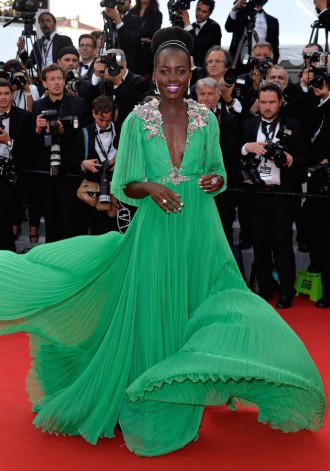Juliet Stevenson On ‘The Letters,’ Mother Teresa, Her Doubts About God [EXCLUSIVE VIDEO]
British actress Juliet Stevenson stars as Roman Catholic sister and missionary Mother Teresa in William Riead‘s The Letters, which explores the truths of one of the most beloved religious figures of the modern day.
Juliet Stevenson On ‘The Letters’
Throughout her life, Mother Teresa confided solely with a priest named Father Celeste van Exem, telling him of her deepest doubts and fears as they pertained to her faith and her relationship with God.
“Everyone thinks of Mother Teresa as someone who is the embodiment of Christian faith, but in fact she felt abandoned by God for many decades, and this caused her a lot of pain and a lot of loneliness,” Stevenson told uInterview in an exclusive interview. “She talks about God as though she’s talking about a husband or a lover. I think few people know that about her and that sits at the center of the film.”
In addition to delving into the darker moments in Mother Teresa’s faith, The Letters also shows the religious sister’s determined dedication to helping the poor. Though she no doubt found the missionary work rewarding, she also found it taxing, in that her good needs were met with an intense degree of attention that had been foreign to her.
“She became a very public figure, very famous for the Christian identity that she had,” said Stevenson, speaking about the pressure Mother Teresa was under. “That must have caused her a lot of private anguish.”
Stevenson noted, however, that Mother Teresa became skilled at managing her own public image, a talent of hers that’s not often appreciated.
“She was very quite worldly and quite political in lots of ways,” Stevenson said with admiration. “She wasn’t always entirely truthful about things; she knew how to play the press. I mean, I think she was very good at her own PR, in a way, and she had to be in order to achieve what she needed to achieve.”
Stevenson, who got a sense of the overwhelming nature of the type of slums in which Mother Teresa helped the poor of India while filming The Letters, regards the Nobel Peace Prize winner for a number things in addition to her savviness.
“She was partly very uneducated, she was partly highly sophisticated, she was very, very tough with her sisters, with her young nuns. But she had to be, they had a lot of work to do – but she was also gentle and compassionate to the destitute,” said Stevenson. “She’s a whole mix of things and that’s really the revelation.”
The Letters is currently in theaters.
I suppose the letters are kind of the backbone of the film’s narrative. The letters are the letters she wrote to her only confidant, really, who was a Roman Catholic priest called Father van Exem, and which express her terrible doubts about her faith. Everyone thinks of Mother Teresa as someone who is the embodiment of Christian faith, but in fact she felt abandoned by God for many decades, and this caused her a lot of pain and a lot of loneliness. She talks about God as though she’s talking about a husband or a lover. I think few people know that about her and that sits at the center of the film. But, the film also explores the story of how she came to work with the poor and so on.
think for her, God was like her loved one, her beloved, her husband or whatever name you like to give it. And she writes very much as though she’s been abandoned; she’s woken up one morning and her husband’s gone. That’s the kind of vocabulary she uses. And of course the pressure on her. She became a very public figure, very famous for the Christian identity that she had. That must have caused her a lot of private anguish. These letters – I think she was terribly concerned that nobody read them or saw them. So this is all – partly what the film is revealing, I think part of the reason they’re canonizing her now – is because of this crisis of faith that she kept going for I think about 40 years in spite of. That’s a lot of why they’re now canonizing her, or trying to.
Well, I think... Gosh, that’s an interesting question. I mean, it was quite a big stretch for me to play somebody with this all-embracing commitment to a sort of celibate, monastic life because I’m a mom with lots of children and I’ve lived very much in the world. But, I could connect with her very much on her response to the poor because I think a lot of people have that response, and she just got up and did something about it you know. Some of the time, it was tough filming in India because we were filming in a real slum, and there was poverty there which I had never witnessed before. I mean, people living with disabled children in tiny tin huts with water swilling around on the floor with less than nothing, and people who received us with such warmth and courtesy and kindness. It was really sort of humbling. But, sometimes I felt a bit overwhelmed by the extent of the poverty in India and being right in and amongst it everyday.
Oh, I think lots of things! She was very quite worldly and quite political in lots of ways. I think people don’t realize that, you know, she was quite tactical. She wasn’t always entirely truthful about things; she knew how to play the press. I mean, I think she was very good at her own PR in a way, and she had to be in order to achieve what she needed to achieve. So I kind of admire her for that, but it’s a less known thing about her. The main surprise of the film is this sort of desperate loss of faith, this struggle with belief, which I think few people would think about. But, she was a great mixture of things: she was partly very uneducated, she was partly highly sophisticated, she was very very tough with her sisters, with her young nuns. But she had to be, they had a lot of work to do – but she was also gentle and compassionate to the destitute. She’s a whole mix of things and that’s really the revelation.
RELATED ARTICLES
Get the most-revealing celebrity conversations with the uInterview podcast!



![Juliet Stevenson On ‘The Letters,’ Mother Teresa, Her Doubts About God [EXCLUSIVE VIDEO]](https://cdn-o9.uinterview.com/wp-content/uploads/2015/12/news-juliet-stevenson.jpeg)

 Click here for the Cannes Film Festival 2015: Best Dressed Slideshow
Click here for the Cannes Film Festival 2015: Best Dressed Slideshow![Marissa Jaret Winokur And Cathryn Michon On ‘Muffin Top: A Love Story’ [VIDEO EXCLUSIVE]](/blank.gif)




Leave a comment